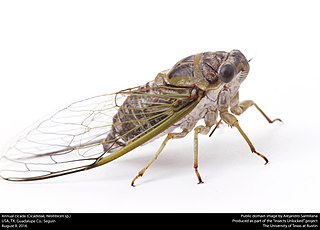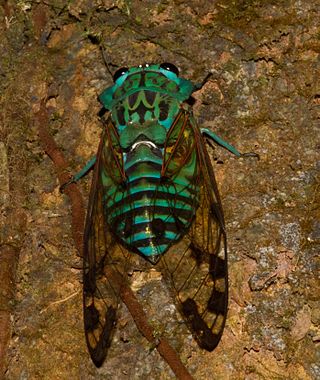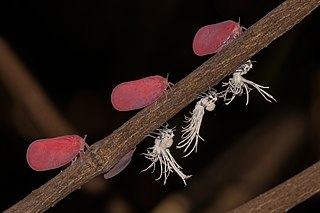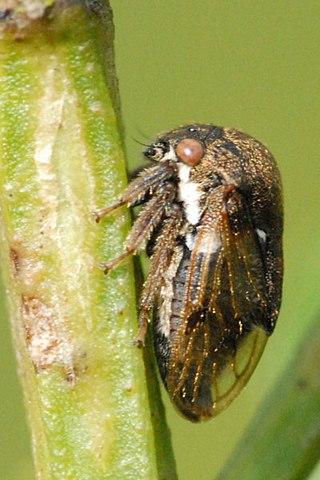
Cicadidae, the true cicadas, is one of two families of cicadas. With more than 3,200 species worldwide, it contains all but two of the living cicada species.

Pentatominae is a subfamily of Pentatomidae, a family of shield bugs. This subfamily is the largest one within the Pentatomidae, having 4937 species classified in 938 genera. Species in this subfamily are phytophages and several of them are considered agricultural pests. Some invasive pentatomines such as Halyomorpha halys and Bagrada hilaris have been considered household pests. Higher systematics of the group have been revised by Rider et al.

The Cicadinae are a subfamily of cicadas, containing the translucent cicadas. They are robust cicadas and many have gaudy colors, but they generally lack the butterfly-like opaque wing markings found in many species of the related Tibiceninae.

The Harpactorinae are a large subfamily of the Reduviidae. About 300 genera and 2,000 species worldwide have been described. Some of the species of the genera Zelus, Pselliopus, Sinea, and Apiomerus are of interest as biological pest control agents.

Cryptotympanini is a tribe of cicadas in the family Cicadidae. They are found in the Nearctic, Palearctic, Indomalaya, Oceania, and Afrotropics.

The Fidicinini are a tribe of cicadas. There are at least 20 genera and 250 described species in Fidicinini, found in the Nearctic and Palearctic.

The Zammarini is a tribe of cicadas. They are native to the Americas, found in the tropical and subtropical regions of the Neotropics. The tribe can be identified by their wide pronotum.

Cercopidae are the largest family of Cercopoidea, a xylem-feeding insect group, commonly called froghoppers. They belong to the hemipteran suborder Auchenorrhyncha. A 2023 phylogenetic study of the family suggested the elevation of subfamily Ischnorhininae to full family status as Ischnorhinidae, leaving a monophyletic Cercopinae.

Flatidae are a family of fulgoroid planthoppers. They are cosmopolitan in distribution and are distinguished from others in the superfamily by a combination of characters. Like all other planthoppers, they suck phloem sap of plants. Some species are known to communicate with vibrations through the plant stems. Communication may be with mates, or with ants that tend the nymphs, protecting them and gathering honeydew secretions. Adults of some species have brightly coloured forewings which are tougher and known as tegmina unlike the membranous hindwings which are used for flight. Although a few can be identified by their coloration, most species requires dissection and examination under a microscope with access to literature on already described species.

The Platypleurini are a tribe of cicadas from the Afrotropical and Oriental regions There are at least 30 genera and 240 described species in Platypleurini.

The Flatinae are a subfamily of planthoppers, erected by Maximilian Spinola in 1839. Genera have been recorded from all continents except Antarctica: especially in tropical and subtropical regions.

Pochazia is a genus of true bugs belonging to the family Ricaniidae.

Anchon is a genus of treehoppers. The name is derived from Greek: ἀγκών referring to the characteristic bend in the backward facing horn that arises vertically from the pronotum and turns at a near-right-angle over the abdomen. Two anterior horns rise outwards to the sides in many species. Species in the genus are found in the Afrotropical, Palearctic, and Indomalayan regions. They are placed in the subfamily Centrotinae.

Gargarini is a tribe of treehoppers belonging to the subfamily Centrotinae. It was first described by William Lucas Distant in 1908, and contains 28 genera.














